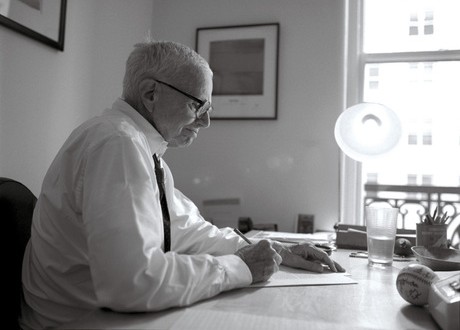William Zinsser died Tuesday in his home in Manhattan, his wife of nearly 60 years Caroline Fraser Zinsser confirmed. He was 92.
A newspaper and magazine reporter into his 40s, Zinsser became a mentor for countless authors, journalists and would-be writers. “On Writing Well,” published in 1976 and praised by The New York Times as worthy of “The Elements of Style,” caught on first among college students and professors, then with the general public, selling more than 1 million copies.
At Yale University, where Zinsser taught creative nonfiction in the 1970s, his students included such future stars as Christopher Buckley, Jane Mayer and Mark Singer.
But Zinsser also valued the business executive trying to compose more understandable memos, the lawyer with a life story to share, the church volunteer eager to document her good work. He loved teaching those without special talent, he once explained, and helping them “solve their problems.”
Working on an old typewriter, Zinsser wrote more than a dozen other books, including “Writing to Learn,” ”Writing With a Word Processor” and the memoir “Writing Places.” He also advised government agencies and corporations, played jazz piano, wrote songs and served as executive editor of the Book-of-the-Month Club. In recent years, he wrote an online column for The American Scholar and taught at Columbia University and The New School for Social Research. After his eyesight failed, he invited students to his apartment and listened to them read from their work.
In firm but friendly style, he bore down upon cliches, pomposities and euphemisms. Politicians, ever at war against plain speech, were easy culprits. He cited Elliot Richardson, a top Republican official in the 1970s, for uttering the most convoluted sentence in memory: “And yet, on balance, affirmative action has, I think, been a qualified success.”
Zinsser was exacting and open-minded. Good writing, he believed, could come from fiction or nonfiction. He praised the history books of David McCullough and Robert Caro, the journalism of Joan Didion, the sports columns of Red Smith. He welcomed anyone able to write with “vigor, clarity and humanity.”
“If nonfiction is where you do your best writing, or your best teaching of writing, don’t be buffaloed into the idea that it’s an inferior species,” he suggested. “The only important distinction is between good writing and bad writing.”
Other prescriptions: Contractions are fine if they set a more conversational tone. Active verbs work better than passive verbs. Keep paragraphs brief and use words that are “short and strong.”
Zinsser, the youngest of four siblings, was born in New York in 1922, the presumed heir to a shellac company his grandfather founded. But journalism was his calling. He taught himself to type and credited his mother with his appreciation for prose writing, remembering how she would clip articles she liked from newspapers.
He attended Princeton University, but in his sophomore year the U.S. went to war and he left for the military. He served in Italy and Africa during World War II and was assigned to write histories of his Army unit. The war would teach him that he could write anywhere, including in a desert tent, hot sand blowing through the flaps.
After returning to the States in 1946, he joined the New York Herald Tribune, where he wrote feature stories, reviewed movies and edited the Sunday drama section. Among the cub reporters he gave assignments: Judith Crist, later the film critic for New York magazine, and Roger Kahn, who wrote the classic baseball book “The Boys of Summer.”
Zinsser later wrote freelance pieces for the Saturday Evening Post, The New York Times Magazine and other publications before joining Yale.
In 1974, with more free time than he desired, he took up an idea from his wife and began a how-to text on writing. He hesitated to enter a field defined by the classic “The Elements of Style,” by William Strunk Jr. and Zinsser’s literary hero, E.B. White. But in looking through “Elements” he saw that it was a set of principles without specific suggestions or guidelines.
“I wouldn’t compete with ‘The Elements of Style,'” Zinsser wrote in his memoir. “I would complement it.”
“On Writing Well” was supposed to be called “Writing Well,” but Zinsser added “On” after learning a book by poet Donald Hall already had his original title. As demanding of himself as he was of others, Zinsser would update his book several times — to correct his failure to use passages from women and nonwhite writers, to note the memoir’s growing popularity, to share thoughts on such innovations as email and blogs.
“And yet, stuck with my traditional skills, I’m not feeling obsolete,” he concluded. “Whatever new technologies may come along, writers will continue to write, going wherever their affections and curiosities beckon. That can make an interesting life.”
Agencies/Canadajournal
 Canada Journal – News of the World Articles and videos to bring you the biggest Canadian news stories from across the country every day
Canada Journal – News of the World Articles and videos to bring you the biggest Canadian news stories from across the country every day



